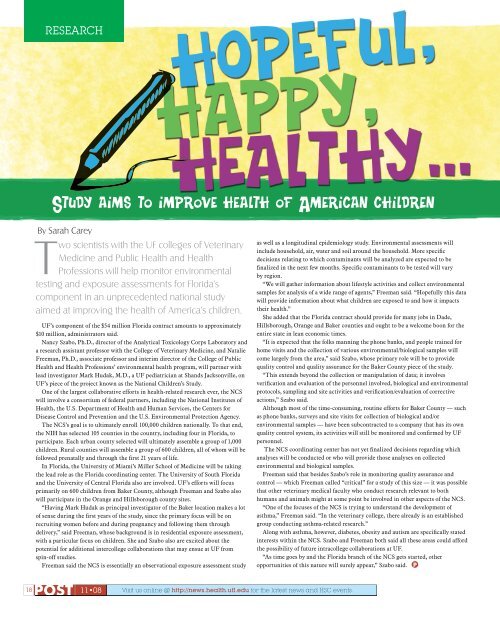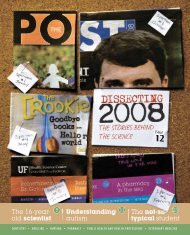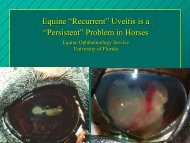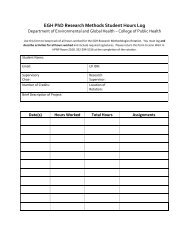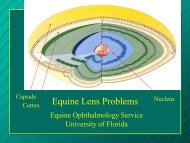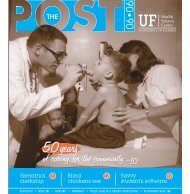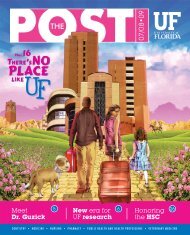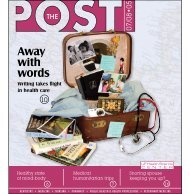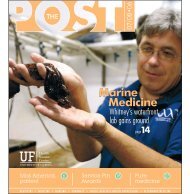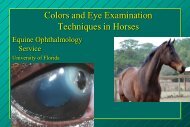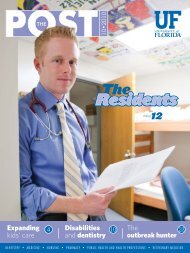POST - UF Health Podcasts - University of Florida
POST - UF Health Podcasts - University of Florida
POST - UF Health Podcasts - University of Florida
Create successful ePaper yourself
Turn your PDF publications into a flip-book with our unique Google optimized e-Paper software.
RESEARCHStudy aims to improve health <strong>of</strong> American childrenBy Sarah CareyTwo scientists with the <strong>UF</strong> colleges <strong>of</strong> VeterinaryMedicine and Public <strong>Health</strong> and <strong>Health</strong>Pr<strong>of</strong>essions will help monitor environmentaltesting and exposure assessments for <strong>Florida</strong>’scomponent in an unprecedented national studyaimed at improving the health <strong>of</strong> America’s children.<strong>UF</strong>’s component <strong>of</strong> the $54 million <strong>Florida</strong> contract amounts to approximately$10 million, administrators said.Nancy Szabo, Ph.D., director <strong>of</strong> the Analytical Toxicology Corps Laboratory anda research assistant pr<strong>of</strong>essor with the College <strong>of</strong> Veterinary Medicine, and NatalieFreeman, Ph.D., associate pr<strong>of</strong>essor and interim director <strong>of</strong> the College <strong>of</strong> Public<strong>Health</strong> and <strong>Health</strong> Pr<strong>of</strong>essions’ environmental health program, will partner withlead investigator Mark Hudak, M.D., a <strong>UF</strong> pediatrician at Shands Jacksonville, on<strong>UF</strong>’s piece <strong>of</strong> the project known as the National Children’s Study.One <strong>of</strong> the largest collaborative efforts in health-related research ever, the NCSwill involve a consortium <strong>of</strong> federal partners, including the National Institutes <strong>of</strong><strong>Health</strong>, the U.S. Department <strong>of</strong> <strong>Health</strong> and Human Services, the Centers forDisease Control and Prevention and the U.S. Environmental Protection Agency.The NCS’s goal is to ultimately enroll 100,000 children nationally. To that end,the NIH has selected 105 counties in the country, including four in <strong>Florida</strong>, toparticipate. Each urban county selected will ultimately assemble a group <strong>of</strong> 1,000children. Rural counties will assemble a group <strong>of</strong> 600 children, all <strong>of</strong> whom will befollowed prenatally and through the first 21 years <strong>of</strong> life.In <strong>Florida</strong>, the <strong>University</strong> <strong>of</strong> Miami’s Miller School <strong>of</strong> Medicine will be takingthe lead role as the <strong>Florida</strong> coordinating center. The <strong>University</strong> <strong>of</strong> South <strong>Florida</strong>and the <strong>University</strong> <strong>of</strong> Central <strong>Florida</strong> also are involved. <strong>UF</strong>’s efforts will focusprimarily on 600 children from Baker County, although Freeman and Szabo alsowill participate in the Orange and Hillsborough county sites.“Having Mark Hudak as principal investigator <strong>of</strong> the Baker location makes a lot<strong>of</strong> sense during the first years <strong>of</strong> the study, since the primary focus will be onrecruiting women before and during pregnancy and following them throughdelivery,” said Freeman, whose background is in residential exposure assessment,with a particular focus on children. She and Szabo also are excited about thepotential for additional intercollege collaborations that may ensue at <strong>UF</strong> fromspin-<strong>of</strong>f studies.Freeman said the NCS is essentially an observational exposure assessment studyas well as a longitudinal epidemiology study. Environmental assessments willinclude household, air, water and soil around the household. More specificdecisions relating to which contaminants will be analyzed are expected to befinalized in the next few months. Specific contaminants to be tested will varyby region.“We will gather information about lifestyle activities and collect environmentalsamples for analysis <strong>of</strong> a wide range <strong>of</strong> agents,” Freeman said. “Hopefully this datawill provide information about what children are exposed to and how it impactstheir health.”She added that the <strong>Florida</strong> contract should provide for many jobs in Dade,Hillsborough, Orange and Baker counties and ought to be a welcome boon for theentire state in lean economic times.“It is expected that the folks manning the phone banks, and people trained forhome visits and the collection <strong>of</strong> various environmental/biological samples willcome largely from the area,” said Szabo, whose primary role will be to providequality control and quality assurance for the Baker County piece <strong>of</strong> the study.“This extends beyond the collection or manipulation <strong>of</strong> data; it involvesverification and evaluation <strong>of</strong> the personnel involved, biological and environmentalprotocols, sampling and site activities and verification/evaluation <strong>of</strong> correctiveactions,” Szabo said.Although most <strong>of</strong> the time-consuming, routine efforts for Baker County — suchas phone banks, surveys and site visits for collection <strong>of</strong> biological and/orenvironmental samples — have been subcontracted to a company that has its ownquality control system, its activities will still be monitored and confirmed by <strong>UF</strong>personnel.The NCS coordinating center has not yet finalized decisions regarding whichanalyses will be conducted or who will provide those analyses on collectedenvironmental and biological samples.Freeman said that besides Szabo’s role in monitoring quality assurance andcontrol — which Freeman called “critical” for a study <strong>of</strong> this size — it was possiblethat other veterinary medical faculty who conduct research relevant to bothhumans and animals might at some point be involved in other aspects <strong>of</strong> the NCS.“One <strong>of</strong> the focuses <strong>of</strong> the NCS is trying to understand the development <strong>of</strong>asthma,” Freeman said. “In the veterinary college, there already is an establishedgroup conducting asthma-related research.”Along with asthma, however, diabetes, obesity and autism are specifically statedinterests within the NCS. Szabo and Freeman both said all these areas could affordthe possibility <strong>of</strong> future intracollege collaborations at <strong>UF</strong>.“As time goes by and the <strong>Florida</strong> branch <strong>of</strong> the NCS gets started, otheropportunities <strong>of</strong> this nature will surely appear,” Szabo said. P<strong>POST</strong> 11•0818 <strong>POST</strong>Visit us online @ http://news.health.ufl.edu for the latest news and HSC events.


